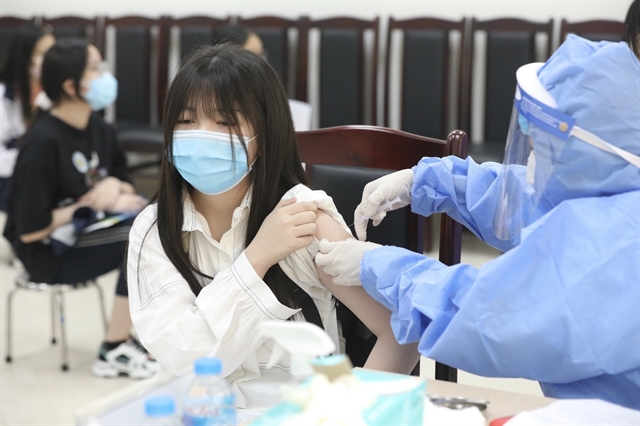 Society
Society

Minister of Health Nguyễn Thanh Long confirmed that Việt Nam did not automatically decide to extend the expiration date of the Pfizer/BioNTech COVID-19 vaccine but based the decision on international norms.

|
| A secondary student in Hà Nội is vaccinated with the Pfizer vaccine. — VNA/VNS Photo |
HÀ NỘI — Minister of Health Nguyễn Thanh Long confirmed that Việt Nam did not automatically decide to extend the expiration date of the Pfizer/BioNTech COVID-19 vaccine but based the decision on international norms.
All vaccines sent to Việt Nam were examined following the World Health Organisation (WHO)’s requirements and the vaccine quality was ensured when administered, he said in a press release issued on Wednesday.
The health minister made the assurance following public concerns over the decision of the Drug Administration of Việt Nam to extend the expiry date of two Pfizer vaccine batches (with over 2.96 million doses) from the original six months to nine months at the storage condition of -90 to -60 degrees Celsius.
The two batches of Pfizer vaccines, numbered 124001 and 123002, are part of Việt Nam’s purchase order with the pharmaceutical company, to be used in the vaccination of children aged 12-17 years old in Việt Nam.
The vaccine batch release certificate said they have an expiry date of November 30, 2021, however, the original six-month expiry date has been extended to nine months, or three months after the expiry date printed on the label, based on a decision (effective October 22, 2021) from Việt Nam’s drug administration after consideration of Pfizer Việt Nam’s confirmation of the new expiry date to be February 28, 2022 instead.
According to experts, for each kind of vaccine, manufacturers carried out research in real time to decide expiration dates. For the Pfizer vaccine, after being authorised for emergency use, the manufacturer continued studying the vaccine’s stability and results showed that the vaccine has stability and ensures quality with an expiration date of nine months, even longer, if the storage conditions of -90 to -60 degree Celsius are maintained, the press release said.
All Pfizer vaccine batches with expiration dates of six months are automatically extended to nine months after the extension approval was made by the US Food and Drug Administration (FDA) on August 22 and European Medicine Agency (EMA) on September 10.
The WHO informed UNICEF about the expiration extension from six to nine months on September 20.
The new nine-month expiry date of the Pfizer vaccine is applied globally and the vaccines can still be used for all eligible people, including children aged 12 and older.
Minister Long said the COVID-19 pandemic is still developing, with a rapid increase in the number of new cases around the world, particularly the appearance of the new variant Omicron. The increase of vaccination pace and coverage and the expansion of vaccination age was the most effective measure to prevent and control the pandemic.
Việt Nam has so far received nearly 29 million doses of Pfizer vaccine and administered 23.6 million doses safely.
Việt Nam is expected to receive 63.5 million doses of Pfizer vaccine in December, of which 40 million doses will be administered for adults and children aged 12-17.
The Ministry of Health will continue receiving and supplying enough vaccines to inoculate people safely, according to Long.
WHO approval
Dr Kidong Park, Representative of the World Health Organisation (WHO) in Việt Nam, has confirmed that it was safe and effective to use Pfizer/BioNTech COVID-19 vaccine batches that have been extended for use three months beyond the expiry date on the packaging, provided that the vaccine meets storage conditions.
Dr Park said the WHO reviewed and approved updated conditions of the Pfizer vaccine and approved the expiration extension of the vaccine in August 2021. The extension from six to nine months is applied globally to all kinds of Pfizer vaccine produced from late December 2020 after it was licensed.
The Pfizer-BioNTech COVID-19 vaccine was the first vaccine approved by the WHO on December 31, 2020 and was listed for emergency use by the WHO.
The WHO recommended the use and storage requirements for the Pfizer vaccine on January 8, 2021 as follows: the vaccine is administered for individuals 16 years of age and older; the first and the second dose should be 21-28 days apart; each dose must contain 0.3ml of vaccine; and the vaccine could be kept in frozen storage up to six months. These recommendations were based on available scientific data at that time.
However, after that, the manufacturer continued researching and developing the vaccine and national vaccine management agencies updated conditions needed for approval after studying scientific evidence and data provided by the manufacturer.
The WHO then reviewed and approved the updated conditions, including expanding the vaccination age to individuals 12 years of age and older and extending the expiration dates of vaccine from six months to nine months, according to Dr Park.
He added that the Pfizer vaccine must meet three storage conditions in order to get the three-month expiration extension: storage conditions between -90 to -60 degrees Celsius must be maintained for the nine months; after removing the vaccine vial from the ultra-cold storage, the vaccine vial can be stored for a maximum of 31 days at a temperature of between 2-8 degrees Celsius before use; and within the nine-month expiration dates, unopened vaccine vials can be stored and transported at a temperature of -25 to -15 degrees Celsius for a maximum of two weeks.
Dr Park said research proved that the quality of the vaccine was the same up to nine months provided that they met ultra-cold storage conditions.
UNICEF Representative in Việt Nam Rana Flowers said the Pfizer vaccine vial had an expiration date of nine months when it was stored at a temperature of between -90 to -60 degree Celsius as recommended by the manufacturer. The cold storage system of Việt Nam has basically met vaccine storage, transport and use requirements, she said.
COVID-19 vaccines are always stored at a temperature of -90 to -60 degrees Celsius during the transportation process to Việt Nam using the manufacturers’ equipment. All vaccine batches used in Việt Nam are assessed for quality and granted licences for administration by the National Institute for Control of Vaccines and Biologicals. So the extension of an additional three months of the expiration date would not affect the vaccine quality, according to Flowers. — VNS



.jpg)
